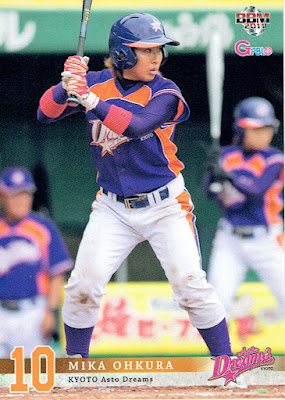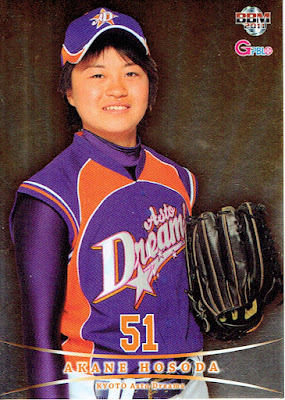In 2011 the JWBL was known as the Girl's Professional Baseball League and consisted of only two teams - the Hyogo Swing Smileys and the Kyoto Asto Dreams. It was the second year that the league played and BBM did cards for at least their first two seasons. I don't know much about the 2010 cards - I don't have any and Ryan only has a handful. I have a bunch of the 2011 cards though - all from Ryan - and he has more than I do.
What I was surprised to discover with the 2011 card he sent me in his last package was that it wasn't from the same set as the other ones he had sent me. It turns out that BBM actually did three sets for the GPBL that year - a 70-ish "regular" set along with a 37-ish card Hyogo team set and a 39-ish card Kyoto team set. I decided that I'd try to put together a checklist for all three sets which may sound like a daunting task when you realize I only have 23 cards from the "regular" set, one card from the Kyoto team set and none from the Hyogo team set. But I had a couple other things going for me - Ryan had posted a bunch of the cards that he had in 2015 and 2018 and he'd sent me the envelopes that cards from the team sets were distributed in that had the checklists for each set on them - although of course they're in Japanese:
The top envelope is from the Hyogo set while the bottom one is from the Kyoto set.
All of that was helpful but it was the way BBM did the card sets themselves that really allowed me to figure out the checklist. For the "regular" set, the players are listed by uniform number - first the Hyogo players and then the Kyoto players. There are 17 Hyogo players and 18 Kyoto players. Now you're probably saying to yourself now "wait a minute - I thought there were 70 cards or so in this set but that only accounts for 35 of them" and you'd be right. But what BBM did was include "foil" or "chrome" cards for all the players. These aren't parallel versions - they have different photos and have checklist numbers from #36 to #70 while the non-foil cards are #01 to #35. The foil cards are in the same order that the non-foil ones are so it's easy to extrapolate the number of the foil card if you have the non-foil one (add 35 to the card number) or vice versa (subtract 35 from the card number).
What also came in really handy is a team card for Kyoto that Ryan had. This card isn't a checklist but it does list all the players for the team with uniform numbers on the back while the front has photos of a couple players with their uniform numbers. (The back also lists the manager and coach for the team along with an "MG" - none of those three have cards in the regular set). I was able to use that to figure out the rest of the Kyoto players - some of the names I had to run through Google Translate and I then corroborated several of the names with other JWBL cards I had. For the Hyogo cards I had to use the team set checklist for the players I didn't have - this wasn't very precise though as I wasn't able to corroborate any of the names of players I didn't have cards of. Luckily Ryan took a look at the cards he had and was able to confirm all the names except one - a name that he thought was "Asako Hagiwara". I found a Japanese Wikipedia page for her that confirmed that the kanji for her name matched the kanji on the team set checklist card, she played for Hyogo in 2011 and her uniform number is in the range that you'd expect - her number was 17 with the person before her in checklist wearing number 13 and the player after her wearing number 18,
That's probably more than enough information on how the sausage got made for this. The upshot is that between everything, we were able to figure out who all the cards were in the set. Let's show some cards - here are the fronts and backs of all 23 cards I have from this set:
Actually let me caveat that "we were able to figure out who all the cards were in the set". We were able to figure out who the first 70 cards in the set were. Ryan had gone through his cards and discovered that he had a card #71 which showed Hyogo catcher Maya Kawaho in street clothes on the front of the card and has an interview with her on the back. Now one thing we don't know is if there are any other of these "interview" cards.
The team sets mirror the "regular" set in that there are two cards for each player. The players are listed in the same order that they are in the "regular" set although I don't know if the higher numbered cards are foil like the higher numbered ones in the other set. Each set contains three additional cards - one for the manager (Toru Kawagoe for Hyogo and Kyosuke Sasaki for Kyoto), one for the coach (Toyoji Matsumura for Hyogo and Tomoya Kawaguchi for Kyoto) and one for something I haven't been able to translate in either set but I think might be the mascot. Both checklists have the first cards for all the players, then the cards for the manager, coach and maybe the mascot, and then the other player cards.
I only have one card from either of these sets - this card of Tomoko Goda from the Kyoto team set:
Notice that the front has a slightly different design than the fronts in the "regular" set. As far as I can tell from the cards that Ryan has posted, it looks like they didn't reuse the player photos. The backs however look very much like the backs of the "regular" cards - notice though that the card number is prefixed with a "K" - the Hyogo cards are prefixed with an "H".
Here are the checklists for the sets - each set is on a different tabL
So I think there's still four questions that are left about these sets:
1. Are there any more interview cards in the "regular" set?
2. What set does the unnumbered Kyoto team card go with? Ryan thinks it's from the team set but we don't know for sure.
3. Is there an equivalent team card for Hyogo?
4. Those two cards I couldn't figure out - #H20 of the Hyogo set and #K21 of the Kyoto set - are they mascot cards,
If anyone has more information on these cards, please let us know!


















































1 comment:
Yes, the missing cards are the mascots. Kotomi-chan for the Asto Dreams and Swinbit for the Swing Smileys.
Post a Comment